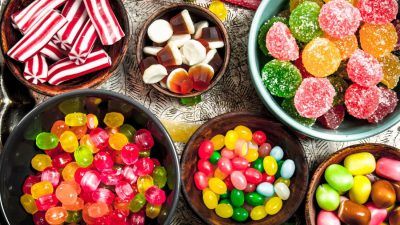10 Recommendations for a Healthy Vegan Diet

The science is in. All the world’s major health organisations agree that a well-planned plant-based diet can provide all you need through all stages of life. But what exactly is a well-planned plant-based diet? Don’t worry, we have all the answers.
1. Five to eight servings of fruit and vegetables a day (but the more the merrier!)
A wide range of fruit and vegetables should form the basis of any healthy diet. Fruit and vegetables contain vital vitamins such as beta carotene (which makes vitamin A), B vitamins and vitamins C, E and K. They also contain minerals and trace elements such as calcium, iodine, iron, magnesium, manganese, phosphorus and potassium.
Around 90 per cent of the UK population is falling short on fibre. Fibre reduces the likelihood of heart disease, strokes and type-2 diabetes. We also need fibre for a healthy gut microbiome as it feeds our ‘good’ bacteria. Scientists studying our microbiome are just beginning to understand the importance of our gut bacteria and how it affects our overall health. Fruit and vegetables are rich in fibre so make sure you get your daily portions.
2. Three to five servings of cereals and wholegrains a day
Population studies suggest that those who eat high amounts of wholegrains live the longest, A review published in The British Medical Journal found that “wholegrain intake is associated with a reduced risk of coronary heart disease, cardiovascular disease, and total cancer, and mortality from all causes, respiratory diseases, infectious diseases, diabetes, and all non-cardiovascular, non-cancer causes.”
That makes wholegrains a powerful and important part of a healthy plant-based diet! Thankfully, they’re easy to include in the diet – choose porridge over pop tarts, replace white pasta and bread with wholemeal varieties and swap white rice for brown rice or quinoa.
3. Two or three servings of pulses
Beans, lentils and peas offer an excellent nutritional package and that’s why they are a part of most traditional cuisines across the world. They are great sources of protein, complex carbohydrates, several B vitamins, vitamin K, calcium, potassium, iron and zinc. Pulses are high in fibre which benefits our digestion and gut microbiome, and the phytoestrogens in soya beans may protect against some cancers.
Thanks to their protein and complex carbohydrates, pulses help stabilise blood sugar and so are great at preventing and managing type 2 diabetes. The combination of protein and fibre slows down your digestion, making you feel fuller for longer. At the same time, the complex carbohydrates provide healthy energy, so you feel great and are less likely to overeat.
4. A handful of nuts and seeds (and a small splash of vegetable oil)
Nuts and seeds are a great source of healthy (polyunsaturated) fats and have been shown to protect heart health. A study published in the Journal of the American College of Cardiology found that people regularly eating nuts had a lower risk of developing heart disease. Walnuts are high in omega-3 fatty acids and almonds, macadamias, hazelnuts and pecans also have heart-protective qualities. Even peanuts (technically a legume) have been shown to reduce the risk of heart disease, as long as they’re unsalted.
You can also get healthy fats from avocados and vegetables oils, such as rape seed oil (for cooking) and extra virgin olive oil (as a dressing). A 2022, randomised control trial in The Lancet found that a Mediterranean diet, rich in olive oil, “was superior to the low-fat diet in preventing major cardiovascular events”, which correlates with previous research such as the Lyon Diet Heart Study.
In addition to their heart-protective effects, nuts and seeds are high in vitamins and minerals. A couple of Brazil nuts will provide your daily selenium, and pumpkin seeds are rich in vitamin K, magnesium and zinc.
5. A good source of omega-3 fatty acids
As previously mentioned, walnuts are a great source of omega-3 fatty acid but nothing compares to fabulous flaxseed.
A great habit to cultivate is to have two tablespoons of ground flaxseed daily – enough to cover your daily omega-3 needs. Just remember, it can be destroyed by heat so should be added either to cold meals, such as your morning cereal or smoothie, or to meals after they’ve been cooked.
Whole flaxseeds are very stable and keep well but their tough skin prevents absorption of their nutrients in the body (they go straight through you!), which is why we should always consume them ground or milled. You can buy pre-ground flaxseed or grind them yourself before using. Once they’ve been ground, store them in an airtight container in the fridge or freezer to preserve their goodness. You can also take flaxseed oil – two teaspoons a day.
There are also algae-derived EPA and DHA supplements available if you want an extra insurance policy to make sure you’re getting enough of this essential fatty acid.
6. A reliable source of vitamin B12
You need only a little B12 but that small amount is vital for maintaining healthy nerve cells and other important functions. B12 is produced by bacteria that live in soil and water. Traditionally, humans and animals got it from eating unwashed foods but modern food production is now so sanitised we now need to get it from other sources, supplements in particular.
While many plant-based dairy alternatives and nutritional yeast are fortified with B12, it can be hard to know exactly how much you’re getting. That’s why Viva! recommends taking a daily 50 microgram supplement or 2,000 micrograms a week.
It’s worth pointing out, the reason meat and dairy contain B12 is because most farmed animals are given a supplement too.
7. A reliable source of vitamin D
Vitamin D is necessary for the regulation of calcium levels in the blood and is needed for healthy bones as it helps your body absorb calcium. It is also important for supporting your immune system.
In spring and summer, most people in the UK get enough vitamin D through the action of sunlight on the skin, but in the winter months a supplement is required whatever your diet. Like vitamin B12, vitamin D can often be found supplemented in dairy alternatives such as soya milk and plant-based cheeses but it’s more reliable to take a vitamin tablet or spray so you can manage the dosage accurately. People who cover up in the summer will need a supplement all year round.
8. A reliable source of calcium
We need calcium to build strong bones and teeth. As a vegan, you can get all the calcium you need from a well-planned diet without the need for a supplement but remember, vitamin D helps you absorb the calcium in your food.
Good sources include: dark leafy greens such as broccoli, kale and cabbage, calcium-set tofu, sesame seeds and tahini, pulses, wholemeal bread and dried apricots. Also buy dairy alternatives such as unsweetened soya and oat milk, yoghurts and cheese, that have been fortified with calcium.
9. A reliable source of iodine
An oft-overlooked mineral is iodine. Iodine is an essential trace mineral which means it is not produced by the body and so needs to be obtained from food or supplements. Unfortunately, it isn’t found in many foods so we have to make sure we get enough. Seaweed, such as nori and kombu, is a good source and some soya milks are now fortified with iodine.
If you are unsure about how much you’re getting, you may choose to take a daily supplement.
10. Plenty of water
No healthy diet would be complete without making sure you drink plenty of water to stay hydrated. It is recommended that we drink six to eight cups of water or fluid a day (more if you are exercising a lot or during hot weather). This can include your unsweetened milk alternative, green tea and filter coffee (despite some myths, a normal amount of coffee or tea is unlikely to dehydrate you).
There you have it. The 10 most important elements of a healthy plant-based diet. If you shape your diet around these recommendations you won’t go wrong. Of course, as well as what we should eat, there are a few things that we should avoid such as ultra-processed foods often high in salt and trans fats, and foods with added sugar. But as long as your overall dietary pattern is a healthy one, the occasional indulgence isn’t going to hurt.







